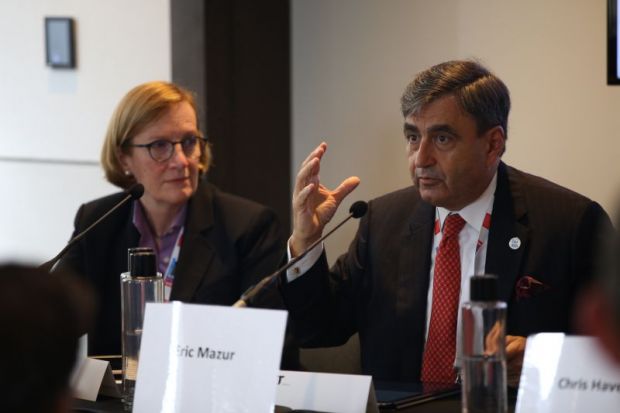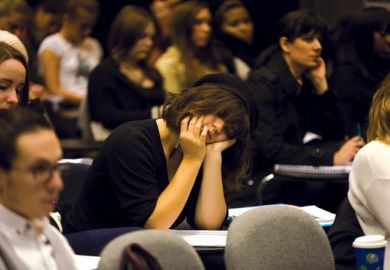The father of the “flipped classroom” has urged academics to take the next leap and to allow undergraduates to bring their laptops and phones into examinations.
Eric Mazur led the shift away from using lectures to impart knowledge and towards using classroom time for discussion, with students reading the necessary texts in advance, when he developed his strategy of “peer instruction” at Harvard University in the early 1990s.
Speaking at the Times Higher Education World Academic Summit, Professor Mazur, Balkanski professor of physics and applied physics at Harvard, said that this had led him to reconsider how he conducted assessment.
Professor Mazur said that the rise of Google and mobile internet access meant that we lived in an age in which we “don’t need to memorise anything”.
As a result, he now encouraged students to bring their laptops and mobile phones into exams, and to “look up whatever you want, whenever you want”, with the aim of testing their creative and analytical skills, as opposed to their information recall.
“That means that I have to make sure that the answers to the questions I ask are not available by simple Google search, but that is a small price to pay,” Professor Mazur said. “[This] has forced me to make my assessments much more meaningful and much more representative of testing the 21st-century skills that we want our students to develop.”
Participating in a panel discussion on how technology can help to improve teaching, Professor Mazur expressed concern about universities’ failure to use technology to develop innovative pedagogies.
“In many…world-class universities, including my own, next to labs where state-of-the-art research is taking place are classrooms where we are essentially teaching in much the same way as we did over 1,000 years ago,” he said. “Essentially instructors are regurgitating readily available information, and later students memorise and regurgitate that exact same information back on exams.”
Professor Mazur argued that universities should use technology to encourage more collaboration and communication between students outside the classroom, highlighting the development at Harvard of Perusall, a social learning platform that allows learners to annotate readings and respond to other students’ comments and questions about texts. It now has more than 100,000 users, and early results indicate that students who use the platform are performing significantly better than their peers, Professor Mazur said.
In the same session, Lino Guzzella, president of ETH Zurich – Swiss Federal Institute of Technology Zurich, argued that technology had changed the learning experience “in many ways”, highlighting widespread adoption of video capture and clicker feedback technology in lectures. However, he said, the pace of innovation had to increase.
“The low-hanging fruit are there, and I hope that most of us have reaped them; but of course the potential is much wider,” Professor Guzzella said. “Learning analytics and going into really deeply worked-out new pedaogical approaches…would be the holy grail, and I think that we are not yet at where we can be [on those advances].”
Panellists said that the ability and willingness of some academics to adopt new technology was often a barrier to pedagogical innovation.
Asked how lecturers could be encouraged to adopt technology and to improve their teaching, Professor Guzzella urged institutions to attach promotion and pay criteria to teaching performance. He also highlighted a prize scheme at ETH Zurich that saw top innovators celebrated on billboards around campus.
“Make them poor or famous,” Professor Guzzella quipped.
POSTSCRIPT:
Print headline: ‘Let students use Google in exams’
Register to continue
Why register?
- Registration is free and only takes a moment
- Once registered, you can read 3 articles a month
- Sign up for our newsletter
Subscribe
Or subscribe for unlimited access to:
- Unlimited access to news, views, insights & reviews
- Digital editions
- Digital access to THE’s university and college rankings analysis
Already registered or a current subscriber?








